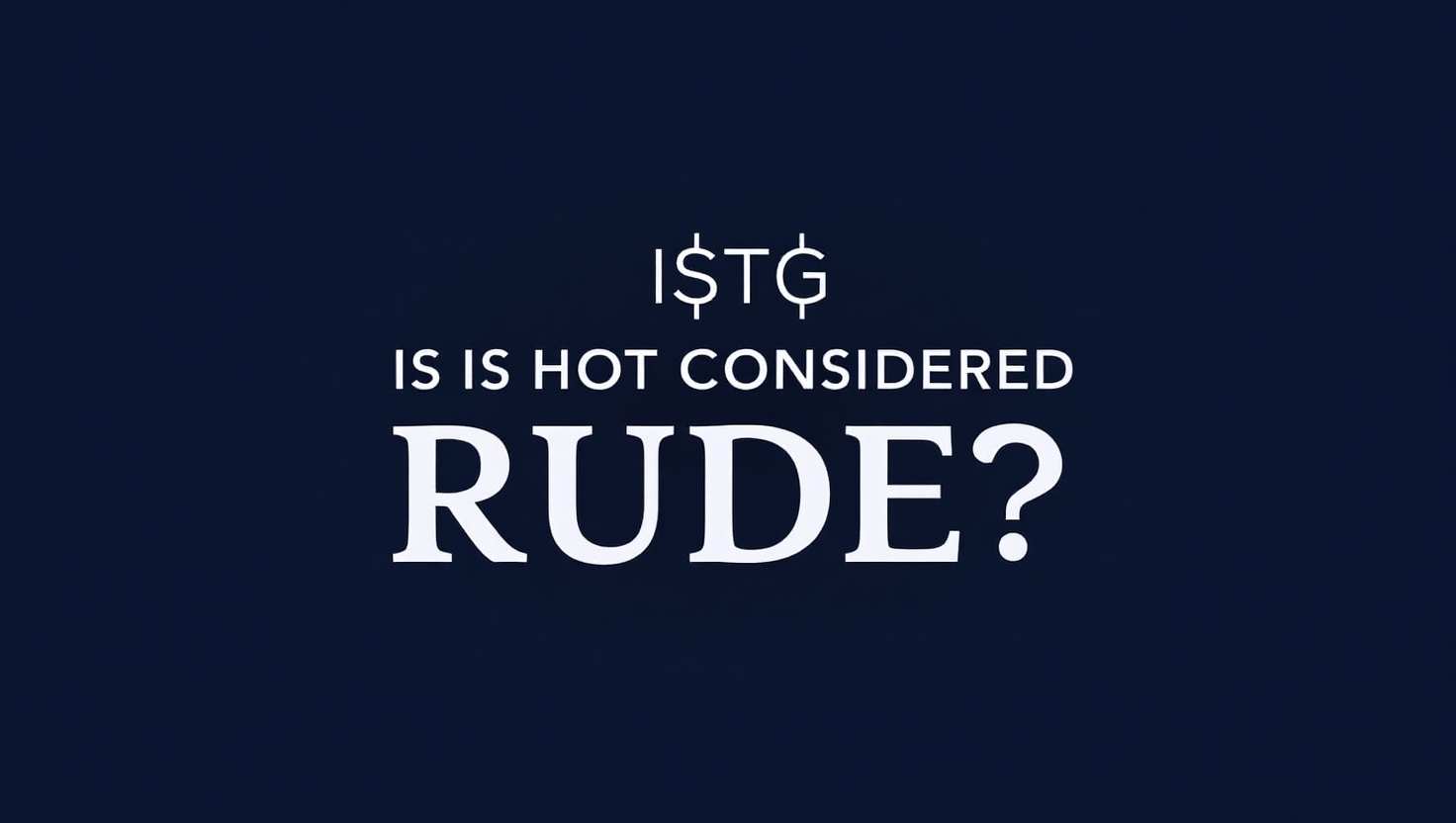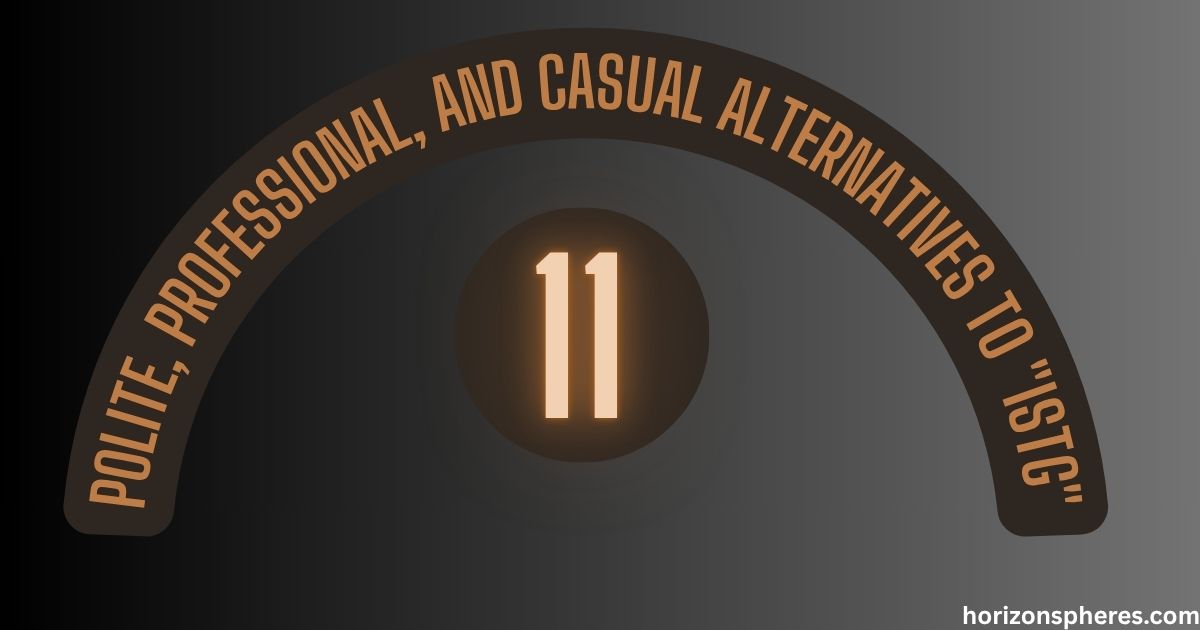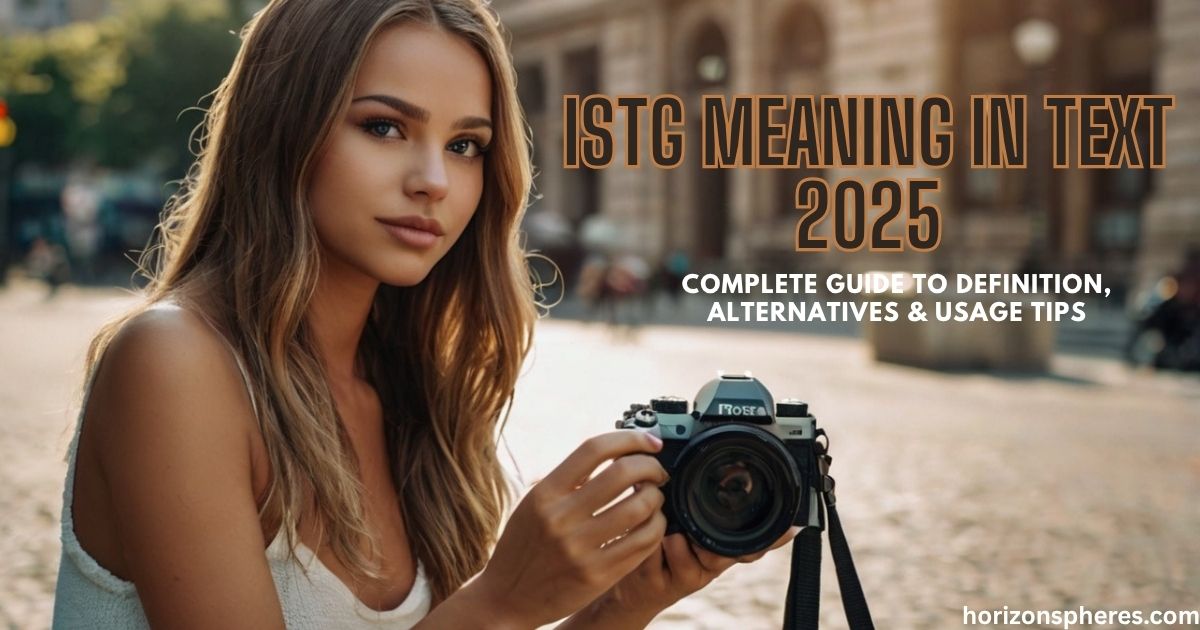Have you ever received a text saying “ISTG this is so annoying!” and wondered what it means? You’re not alone. ISTG has become one of the most popular texting abbreviations in 2025, especially among younger users on platforms like TikTok, Snapchat, and Instagram.
Whether you’re a parent trying to understand your teenager’s messages, a professional navigating workplace communication, or someone curious about internet slang evolution, this comprehensive guide will help you master ISTG meaning in text and discover appropriate alternatives for every situation.
What Does “ISTG” Mean?
ISTG stands for “I Swear to God” – a powerful expression used to emphasize sincerity, frustration, or disbelief in digital communication. This acronym has evolved from its religious origins into mainstream internet slang that appears across all social media platforms and texting conversations.
The 2025 ISTG meaning in text varies significantly based on context. When someone types ISTG, they’re making a strong assertion about their feelings or the truth of their statement. Understanding this evolution helps decode modern digital communication patterns.
ISTG meaning from a girl often carries emotional weight, expressing frustration, excitement, or sincerity in conversations. Similarly, ISTG meaning in chat serves as dramatic emphasis rather than literal religious invocation.
| Context | Example | Meaning |
| Frustration | “ISTG if he’s late again…” | Expressing annoyance |
| Excitement | “ISTG this concert was amazing!” | Showing enthusiasm |
| Sincerity | “ISTG I didn’t know about it” | Emphasizing truthfulness |
| Disbelief | “ISTG you actually did that?” | Expressing shock |
Key Points:
- Originally meant “I Swear to God”
- Now used for emotional emphasis
- Common across all age groups
- Platform-specific variations exist
Is “ISTG” Considered Rude?

The appropriateness of ISTG depends entirely on your audience and context. While not technically profanity, it can appear overly emotional or offensive in formal settings. Religious sensitivity plays a major role – some faith communities find casual use of religious phrases disrespectful.
Professional environments generally discourage ISTG usage because it appears unprofessional in workplace messages. Generational differences also affect perception – older adults might interpret it as aggressive while Gen Z uses it casually without second thought.
2025 ISTG meaning in text funny contexts show how humor has transformed its usage. Many users now employ it for comedic effect rather than serious emphasis, especially on social media platforms.
Considerations for Usage:
- Audience religious beliefs
- Professional vs. casual settings
- Generational communication gaps
- Cultural sensitivity awareness
When to Use (or Not Use) ISTG
Understanding appropriate contexts for ISTG helps avoid communication mishaps and maintain respectful relationships across different social and professional environments.
✅ Appropriate Contexts:
Close friends and siblings typically understand your communication style and won’t misinterpret intentions. Playful conversations where everyone’s joking around naturally accommodate this type of expression. Social media captions on platforms like TikTok and Instagram embrace casual internet slang as part of their culture.
Gaming communities and online forums where informal communication dominates welcome ISTG for emotional emphasis. Peer conversations among people sharing similar communication patterns work well for this abbreviation.
❌ Avoid In:
Professional emails require refined alternatives maintaining credibility and respect. Workplace messages, even casual ones, benefit from more professional language choices. Academic settings and formal documents demand professional language standards that exclude internet slang.
Cross-cultural communication and interfaith dialogues make ISTG potentially offensive due to religious sensitivity. First impressions with new people or professional relationships need neutral expressions.
| Appropriate | Avoid |
| Friend texting | Professional emails |
| Social media posts | Workplace messages |
| Gaming chats | Academic writing |
| Casual conversations | Religious settings |
| Peer interactions | Cross-cultural talks |
11 Polite, Professional, and Casual Alternatives to “ISTG”

Replacing ISTG with appropriate alternatives maintains your authentic voice while respecting different audiences and contexts. These options range from formal business communication to casual social interactions.
Professional Alternatives
“I promise” works perfectly for business reassurance and building trust. “I assure you” provides professional confidence in client communications. “You have my word” establishes credibility in formal settings.
“Truthfully” demonstrates transparency in professional discussions. “I guarantee” shows commitment in business contexts.
1. I Promise
Tone: Polite, sincere Example: “I promise the project will be completed on time.” Best for: Professional reassurance, building trust
2. I Swear
Tone: Casual, emotional Example: “I swear that movie was incredible.” Best for: Informal conversations, expressing opinions
3. Honestly
Tone: Neutral, straightforward
Example: “Honestly, I wasn’t expecting such results.” Best for: Giving opinions, neutral emphasis
4. I Mean It
Tone: Assertive, direct Example: “I’m applying this time. I mean it.” Best for: Showing determination, serious conversations
5. No Joke
Tone: Playful, casual Example: “That restaurant has amazing food, no joke.” Best for: Light-hearted emphasis, friendly conversations
6. I’m Not Even Kidding
Tone: Friendly, animated Example: “I’m not even kidding—that was terrible.” Best for: Expressing reactions, casual conversations
7. I Give You My Word
Tone: Formal, trustworthy Example: “I give you my word it’ll remain confidential.” Best for: Formal promises, professional assurances
8. Cross My Heart
Tone: Nostalgic, sincere Example: “Cross my heart, I didn’t touch it.” Best for: Playful sincerity, childhood nostalgia
9. Believe Me
Tone: Calm, earnest Example: “Believe me, I understand your feelings.” Best for: Showing empathy, clarifying intentions
10. Truthfully
Tone: Professional, honest Example: “Truthfully, I was nervous about presenting.” Best for: Professional transparency, honest admissions
11. As God Is My Witness
Tone: Dramatic, serious Example: “As God is my witness, I’ll fix this.” Best for: Dramatic emphasis (use cautiously)
More Post: WTW Meaning: What It Stands For and How to Use It in Text Conversations Like a Pro
Tone Matters: How to Choose the Right Alternative
Language success depends on matching your expression to the situation. Communication with friends differs drastically from professional interactions. Understanding tone sensitivity helps navigate various contexts effectively while maintaining authentic expression.
Professional Conversations
Workplace communication requires alternatives conveying sincerity without emotional drama. “I assure you” builds confidence in client relationships. “Truthfully” demonstrates transparency in team discussions. “I give you my word” establishes trust in formal agreements.
These options work excellently in business emails, client presentations, and professional meetings because they maintain credibility while expressing emphasis.
Polite Conversations
Respectful communication needs balanced options that aren’t overly formal. “Honestly” provides straightforward emphasis without casualness. “I mean it” shows sincerity without drama. “Believe me” builds connection while maintaining respect.
Perfect for cross-cultural interactions, interfaith discussions, and situations requiring cultural sensitivity.
Casual Texting or Social Media
Social media interactions welcome playful alternatives maintaining energy. “No joke” fits TikTok comments perfectly. “I swear” works great for Instagram captions. “I’m not even kidding” expresses disbelief naturally.
What does ISTG mean on Snapchat often relates to quick emotional reactions where these alternatives work wonderfully.
| Setting | Best Alternatives |
| Business | I assure you, Truthfully, I promise |
| Polite | Honestly, I mean it, Believe me |
| Casual | No joke, I swear, Not even kidding |
How the Meaning of “ISTG” Has Evolved
Language evolution in the modern digital era has completely transformed ISTG’s original meaning. Initially, “I swear to God” carried significant religious weight for making solemn vows in legal or spiritual contexts. Western pop culture and internet culture have reshaped this traditional expression.
Pre-2020 usage appeared in more serious contexts, even digitally. People exercised caution using religious expressions casually. Current 2025 usage shows ISTG appearing everywhere from TikTok comments to casual texting without religious consideration.
2025 ISTG meaning in text urban dictionary definitions reflect this transformation, showing purely secular emphasis rather than spiritual invocation. Platform-specific evolution has created unique usage patterns across different social media environments.
Evolution Timeline:
- Original: Religious oaths and vows
- Early Internet: Serious digital emphasis
- 2020-2025: Casual emotional expression
- Current: Mainstream internet slang
Popular Variants and Emojis That Go With “ISTG”
Modern texting trends have created numerous combinations amplifying ISTG’s emotional impact. These variants demonstrate how digital communication continues evolving with emoji integration and abbreviation combinations.
ISTG for meaning in chat combines multiple emphasis layers – “I swear to God for real for real” – showing extreme sincerity or disbelief. This triple emphasis appears frequently in gaming communities and youth conversations.
Common Variants:
- ISTG 😭😭😭 – Overwhelming emotion (funny/sad/frustrating)
- ISTG fr – “For real” double emphasis
- ISTG 💀 – Something so unbelievable it’s “killing” you
- ISTG bro – Casual, friendly peer version
- ISTG rn – “Right now” immediate emphasis
| Variant | Meaning | Best Use |
| ISTG 😭 | Emotional overwhelm | Funny/sad content |
| ISTG fr | Double emphasis | Serious conversations |
| ISTG 💀 | Extreme disbelief | Shocking situations |
| ISTG bro | Casual friendly | Peer interactions |
Alternatives Based on Emotions
Understanding the emotional context behind ISTG helps choose better alternatives matching specific feelings and intentions. Emotional intelligence in digital communication improves relationship building and conflict prevention.
Frustration
Frustrated communication needs alternatives expressing annoyance without escalating conflicts. Instead of “ISTG if he texts again…”, try professional options maintaining dignity while acknowledging feelings.
Better alternatives:
- “I’m getting frustrated with constant messages”
- “His texting is becoming problematic”
- “Honestly, I need space from messaging”
Disbelief or Sadness
Overwhelming situations require alternatives acknowledging emotional states while maintaining composure. Replace “ISTG I can’t handle this…” with options opening support possibilities.
Supportive alternatives:
- “This situation feels overwhelming”
- “I’m struggling to process everything”
- “Truthfully, I need help coping”
Excitement or Joy
Positive emotions deserve enthusiastic alternatives maintaining maturity. 2025 ISTG meaning in text funny contexts often involve excitement, but professional alternatives work better across audiences.
Enthusiastic options:
- “I honestly can’t believe how amazing this is!”
- “No joke, this might be my best day ever”
- “I’m not kidding—everything’s going perfectly”
More Post: WYF Meaning: The Ultimate 2025 Guide That Will Transform Your Digital Communication Skills
Regional and Platform Differences
ISTG meaning in social media varies across platforms and geographic regions. TikTok usage tends toward humor and exaggeration. Instagram features it in captions expressing excitement or frustration. Snapchat employs it for quick emotional reactions.
Regional variations across the United States show interesting patterns. West Coast tech culture embraces internet slang more readily. East Coast maintains stricter professional boundaries despite casual usage. Southern states show more religious sensitivity due to Bible Belt traditions.
Platform-Specific Usage:
- TikTok: Humorous, exaggerated content
- Instagram: Emotional captions and comments
- Snapchat: Quick reaction messages
- Twitter: Both serious and playful contexts
- Gaming: Competitive emphasis and frustration
Professional Guidelines for 2025
Workplace communication in 2025 requires understanding company policies regarding social media language and professional messaging. Many organizations include communication guidelines in employee handbooks specifically addressing internet slang usage.
Industry considerations vary significantly. Tech companies might tolerate casual language while finance, healthcare, and legal industries maintain stricter standards. Client communication never tolerates ISTG usage – always choose professional alternatives building credibility.
Remote work considerations include Slack messages, video call chats, and email communications where digital professionalism creates lasting impressions with colleagues and supervisors.
Professional Standards:
- Never use ISTG with clients
- Avoid in formal emails
- Consider company culture
- Maintain professional reputation
Frequently Asked Question
What does ISTG mean in text?
ISTG stands for “I swear to God,” used for emotional emphasis in casual digital communication and social media.
What does BBG mean in a text from a girl?
BBG typically means “baby girl,” used as an affectionate term between close friends or romantic partners in texting.
What to reply to ISTG?
Reply contextually—acknowledge their emphasis with “I believe you,” “okay,” or respond to their underlying message or emotion.
What does ISTG mean on Snapchat?
On Snapchat, ISTG means “I swear to God,” often used for dramatic emphasis in casual conversations and reactions.
What is ngl in texting?
NGL means “not gonna lie,” used to preface honest opinions or admissions in casual texting and social media.
What does OTP mean in text?
OTP typically means “one true pairing” in fandom contexts, or “one-time password” in security contexts, depending on usage.
Conclusion
ISTG meaning in text represents more than internet slang—it reflects how digital communication shapes modern relationships and expression. Understanding when to use ISTG versus professional alternatives helps navigate 2025’s complex communication landscape effectively.
Whether texting friends, messaging colleagues, or posting on social media, choosing context-appropriate language builds stronger connections while avoiding potential misunderstandings. Master these alternatives, and you’ll communicate confidently across any platform or audience.

Website administrator with a love for digital innovation, committed to creating an informative and welcoming space online.










